Are Trump's 'Liberation Day' Tariffs Illegal?
Several businesses harmed by Trump's "Liberation Day" tariffs have filed a lawsuit challenging his use of emergency economic powers.

In the wake of what President Donald Trump called "Liberation Day," Victor Owen Schwartz has been scrambling.
As the owner of VOS Selections, a New York-based importer and distributor of wines and spirits, Schwartz is required by state law to list his prices every month on a publicly available database. The day after Trump's tariffs were announced, he was poring over his records—drawn from more than 300 suppliers across six continents—and trying to figure out what to do with each of the thousands of stock-keeping units (SKUs) in his inventory.
"We had to go through every single SKU to make a strategic decision about what we were going to do with our prices on that item. When it was shipping, what was in stock, when we think we're going to have to reorder, what was going to be the impact," Schwartz told Reason in an interview on Tuesday.
It's not just the added cost that's been a problem—though that is certainly a big one in a competitive industry running on small margins. It's also the fact that tariffs have been on and off and on again in recent weeks. That's made it "impossible" to plan ahead, Schwartz says, and has left him unable to know what he's buying, how much he needs to sell, or what the future could hold for his 19 employees.
For Schwartz and many other American business owners, there's no doubt that Trump's tariffs have sowed uncertainty, fractured supply chains, and raised prices.
They also violated the law, a newly filed lawsuit argues.
Schwartz is one of several plaintiffs in that lawsuit, filed Monday by the Liberty Justice Center (LJC), challenging the Trump administration's authority to levy the 10 percent across-the-board tariffs the president announced last month. The lawsuit argues that Trump has overstepped the authority granted by the International Emergency Economic Powers Act (IEEPA), and that Congress could not delegate such broad, unlimited powers to the president even if it wanted to do so.
"No one person should have the power to impose taxes that have such vast global economic consequences," Jeffrey Schwab, a senior attorney for the LJC, a nonprofit public interest law firm, tells Reason.
Since its passage in 1977, the IEEPA has been used dozens of times to impose sanctions on foreign countries, but it had never been used to set tariffs on imports to America until Trump invoked the law in February to tariff imports from Canada, China, and Mexico. (That use of the law has also been challenged by the LJC in a separate lawsuit.)
On April 2, the White House again invoked the IEEPA to levy 10 percent tariffs on nearly all imports to the United States, and higher tariffs on goods from certain other countries based on a crude (and inaccurate) calculation of the trade barriers imposed by those countries on American goods. Those higher tariffs are now on hold, but the 10 percent universal tariffs took effect last week.
In the lawsuit, filed in the U.S. Court of International Trade, the plaintiffs argue that the IEEPA authorizes emergency powers only in response to "unusual and extraordinary" threats to the United States. Trade deficits, which the White House claims are the emergency the tariffs are meant to address, are neither unusual nor extraordinary—and Trump's 10 percent tariffs apply even to imports from countries that run a trade surplus with the United States, like Brazil.
More to the point: It is simply untrue that the wines Schwartz imports from France or Italy constitute an emergency that threatens Americans.
And even if Congress did intend to give the president such sweeping powers, that delegation of authority would be unconstitutional, Schwab argues. That's because it would run afoul of the "major questions" doctrine, which requires Congress to decide issues of "vast economic and political significance" and which has recently been the basis of some prominent Supreme Court cases.
"I think having power over essentially the worldwide economy," Schwab says, "if anything's a major question, it's that."


Show Comments (21)